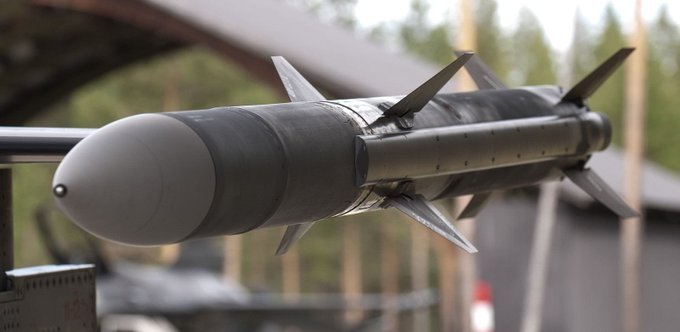The deal includes advanced C8 and D3 variants, fueling speculation of upgrades to Pakistan Air Force F-16 jets. Contract modifications signal growing defence cooperation amid warming US-Pakistan relations following recent diplomatic talks.
BY PC Bureau
Pakistan is set to acquire AIM-120 Advanced Medium-Range Air-to-Air Missiles (AMRAAM) from the United States, signaling a new phase in defence cooperation between the two countries, the US Department of War (DoW) said in an official statement.
A recently modified arms contract listed Pakistan among confirmed foreign buyers of the Raytheon-manufactured missile system. The company received an additional USD 41.6 million on a previously awarded contract (FA8675-23-C-0037) for production of the AMRAAM C8 and D3 variants, raising the total contract value to over USD 2.51 billion, the DoW added.
The statement did not specify the exact number of missiles Pakistan will receive. The deal also includes other countries such as the United Kingdom, Germany, Australia, Japan, and Saudi Arabia, with work under the agreement expected to continue until May 2030.
The inclusion of Pakistan has triggered speculation that the Pakistan Air Force (PAF) may be planning upgrades to its F-16 fleet, the only platform compatible with the AMRAAM. The missile reportedly played a role in 2019, when a PAF F-16 reportedly downed an Indian Air Force MiG-21 flown by Wing Commander Abhinandan Varthaman.
According to defence publication Quwa, the AIM-120C8 variant in the new order is the export version of the AIM-120D, currently the most advanced AMRAAM in US service. Pakistan currently operates the older C5 variant, with approximately 500 acquired in 2010 along with its Block 52 F-16s.
JUST IN🇵🇰🇺🇲🔥 Pakistan to receive US-made Raytheon AIM 120 Advanced Medium Range Air to Air Missile (AMRAAM) worth $42 billion to equip it’s F-16 jets against India’s S-400 and Rafale. pic.twitter.com/6vHD9Y12Xo
— RKM (@rkmtimes) October 7, 2025
The missile deal follows a notable warming of Islamabad-Washington relations. Last month, Donald Trump met Pakistani Prime Minister Shehbaz Sharif and Army Chief Field Marshal Asim Munir in Washington DC. Earlier in June, Munir had a rare one-on-one Oval Office meeting with Trump.
READ: Student from Gujarat Captured in Ukraine Fighting for Russian Forces
In July, PAF Chief Air Chief Marshal Zaheer Ahmed Babar visited the US State Department, further strengthening bilateral ties, which improved after the brief India-Pakistan conflict in May. Following the clash, Pakistan credited Trump for facilitating a ceasefire and even proposed his name for the Nobel Peace Prize, though India rejected the claim, stating the truce followed direct talks between the Directors General of Military Operations (DGMOs) of both countries.
The missile contract also highlights the strategic context of the region. In February 2019, India conducted an intelligence-led airstrike on a Jaish-e-Mohammed training camp in Balakot, targeting senior commanders and jihadis preparing for fidayeen operations.
The Raytheon contract modification (P00026) for USD 41.6 million under a firm-fixed-price arrangement will produce the C8 and D3 variants, according to the US Department of War press release on September 30. Analysts suggest that the missile supply could enhance PAF’s air combat capabilities while further signaling closer defence collaboration between the US and Pakistan.













